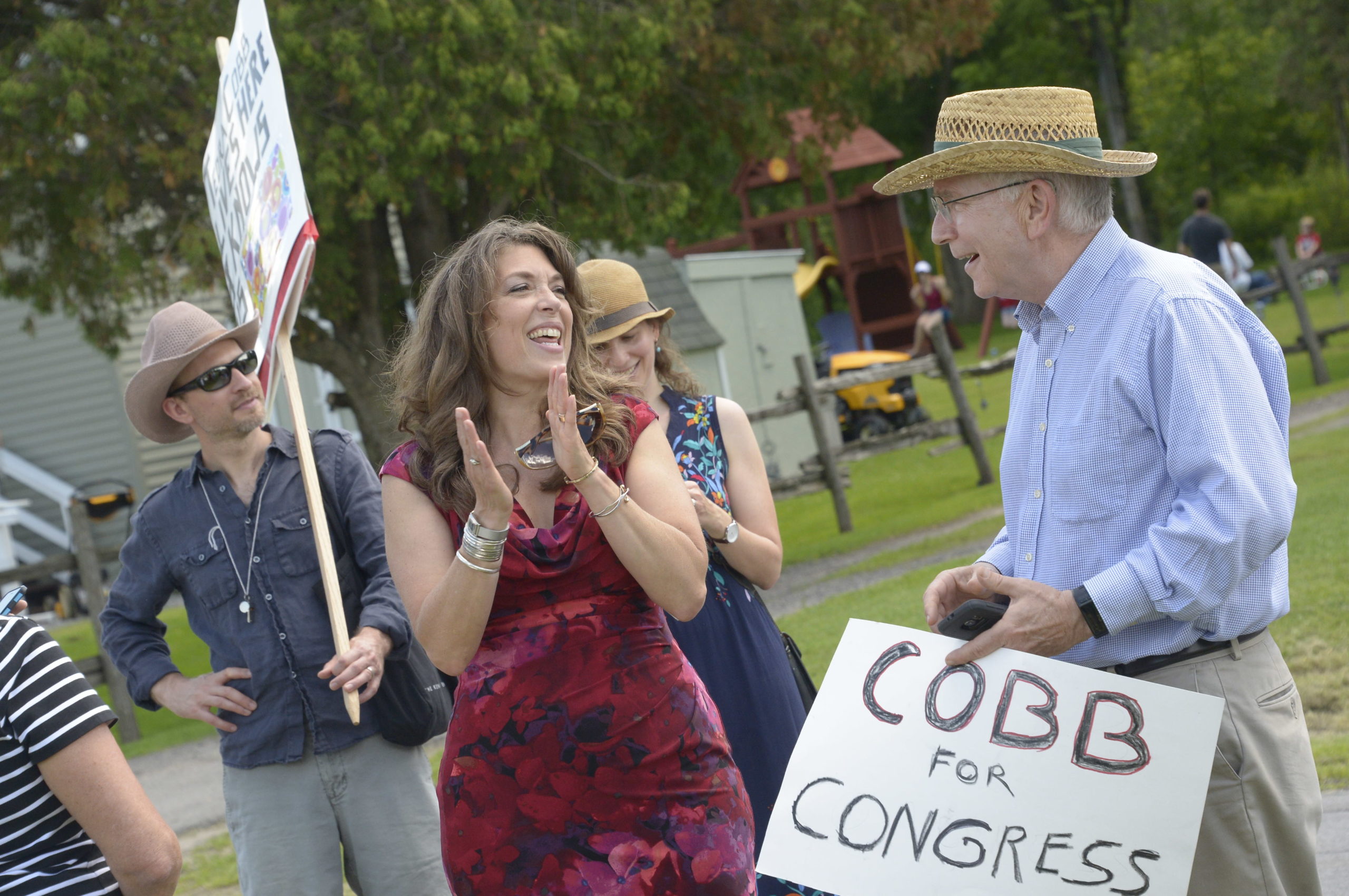In the coming election, the 21st Congressional district of northern New York State will choose between an incumbent who voted to reverse the Affordable Care Act—and a Democratic challenger who has devoted her political career to expanding healthcare access.
On a recent Thursday, Tedra Cobb rolled out of bed before 6 a.m. and did a kickboxing workout in the basement of her home in Canton, N.Y. She needed to blow off some steam–or “get my ya-yas out,” as she put it—after a frenetic few days traversing her 17,000 square mile district in upstate New York, the largest Congressional district east of the Mississippi, where she’s running against Republican incumbent Rep. Elise Stefanik.
Those who watched the impeachment hearings will remember Stefanik, who achieved dubious fame with her unswervingly Trump-loyal line of questioning. On November 17 Trump tweeted a clip of Stefanik grilling former Ambassador Marie Yovanovitch about Hunter Biden and the Ukrainian energy company Burisma, commenting: “A new Republican Star is born.” The 35-year-old Congresswoman was rewarded for her dramatic, if intellectually dishonest, interrogations with a slot on Trump’s impeachment defense squad, alongside seven of the biggest far-right devotees in the House of Representatives. By the time Stefanik flew back from Iowa—photographed on a plane packed with surrogates wearing red “Keep America Great” hats—Trump was getting ready for his post-impeachment revenge spree, which Stefanik dutifully defended in the press. And the love fest continues: “Trump Has A Crush on Rep. Elise Stefanik,” declared a recent headline in City & State, a local news outlet.
Trump went so far as to single out Stefanik during his post-acquittal speech in the White House East Room. “It’s most incredible what’s going on with you, Elise,” he said. “I was up campaigning for helping her and I thought, ‘She looks good, she looks like good talent.’ But I did not realize when she opens that mouth, you were killing them, Elise, you were killing them.” And, if nothing else, Trump loves a killer that looks good on television.
Despite the impeachment hearings, Trump’s nationwide approval rating is at 49 percent—an all-time high since he took office in 2017. But in Northern New York, the 21st district—a mostly rural, economically challenged region that borders Vermont and Canada—is something of a “pivot” zone: it went twice for Obama before flipping red in 2016. So, will Elise Stefanik’s association with an increasingly erratic, impeached President help or harm her in 2020? And how will Cobb adapt for her rematch against Stefanik at a time when all local politics are being devoured by a national meta-narrative?
I was looking forward to discussing these issues with Cobb, 52, who is a former volunteer firefighter, ESL teacher, healthcare non-profit founder and St. Lawrence County legislator, as she gears up for one of the most closely watched Congressional races in the country this November.
There were some hurdles, however—mostly self-inflicted. That is to say, TapeACall Pro, the app I typically use to record interviews, kept malfunctioning. After the third dropped call, I apologized to Cobb, explaining that I was going to attempt to use an old-school digital voice recorder to capture our conversation instead. There was one problem: I hadn’t changed the batteries since the Obama Administration. Could she call me back in five minutes? Far from being annoyed by my technological issues, Cobb was calm and compassionate, seeing this mishap in a broader context: “That’s what we all need—many, many Plan B’s,” she said.
I had not yet internalized the lesson of the Iowa Democratic caucuses debacle: if you want to get something done, do not rely on an app.
Once I figured out my Plan B, Cobb told me about how her career in public service led her to this moment. A resident of St. Lawrence County for the past 30 years, she was inspired to run for the first time in 2017, after Stefanik voted to repeal the Affordable Care Act. For Cobb, who had spent her career as a healthcare advocate—she worked as an educator for a local HIV/AIDS outreach program and served as Executive Director of a community health non-profit—the vote was a call to action. Just a year earlier, her daughter, now a senior at Cornell, had to have emergency back surgery, “and I didn’t blink an eye because I knew I had good insurance,” recalls Cobb, who at the time was working part-time at SUNY Potsdam, her alma mater.
But a month after her daughter’s surgery, Cobb lost her job and her medical insurance. She realized that Stefanik’s vote to end the Affordable Care Act “would have repealed all the protections for people like my kid who have preexisting conditions,” she said. “I’ve been elected before”—to the St. Lawrence County legislature, where she beat a Republican incumbent and served for eight years—“and I just knew that feeling of, ‘I’ve gotta run.’”
Cobb won the 2018 primary with 56 percent of the vote, but her victory was a pyrrhic one: she had blown through all her money and had to start fundraising from scratch for the general election, during which she was outspent by her opponent 3-to-1. Stefanik won the election by a 14 percentage-point margin, which seems like a lot until you compare it with her margin of victory in the previous election—35 percentage points—when she ran against a retired army colonel named Mike Derrick. Given that context, Cobb was encouraged by the results.
“I knew going in that it might take two cycles,” she said.
Supporters in her district are sticking with her. Rebecca Y. Rivers, owner of the Northern Light Yoga studio in Canton, New York, voted for Cobb in 2018 and plans to do so again this year. “I believe Tedra has what it takes to win because she has demonstrated greater interest in the residents of NY-21 than her opponent has,” says Rivers, 53, adding that she shares Cobb’s positions on healthcare, reproductive choice for women, environmental protection and public education. “Many in this district are seeking new representation after feeling that they haven’t been heard by Rep. Stefanik, who was making herself rather scarce and inaccessible in the district prior to seeing Tedra’s popularity increase.” (Until 2018, when she and her husband bought a home in Saratoga County, Stefanik didn’t live in her district, using a home that was owned by her mother as her address. “I like to say that we finally made her pay taxes here, like the rest of us,” said Cobb.)
Michelle Poccia, a real estate broker who lives in Wilton, New York, says she had “high hopes” for Stefanik when she took office in 2015 at the age of 30, making her at the time the youngest woman to ever serve in Congress. “It sickens me to see someone from her generation making a play to be a career politician by latching on and following the cues of some of the most irritating, non-productive talking heads of her party,” says Poccia, 64, who changed her lifelong party affiliation as an Independent to a Democrat in 2016. “Being a puppet to the likes Jim Jordan and so obviously seeking favor with the most corrupt President in our country’s history has been painful to watch.”
It has been painful not just for people in the 21st District. This time around, with Stefanik’s rise to the national spotlight, Cobb has seen more support emerge nationwide as a result. Before the impeachment hearings began last fall, Cobb had raised $656,000 and had about 2,000 Twitter followers. But by November 18, right after Stefanik battled with Rep. Adam Schiff when she interrupted the House Impeachment hearings, Cobb had a blowout fundraising weekend, generating $1 million from donors in all 50 states. Since then, her Twitter following has grown to more than 262,000, compared to Stefanik’s 324,000. At last count, Cobb had $2.7 million in her war chest, versus Stefanik’s $4.5 million. She recently was endorsed by End Citizens United, a non-profit devoted to getting money out of politics, which means that Cobb won’t accept money from corporate PACs; her campaign’s average contribution size is $27.
And Stefanik seems to be feeling the heat. “My opponent is raising money from the Hollywood liberals calling me #TrashyStefanik,” she tweeted on November 17. She was referring to George Conway, the husband of White House advisor Kellyanne, whose vocal opposition to Trump is an ongoing media saga. Conway tweeted on November 16, “.@EliseStefanik is lying trash. Please give to her opponent, @TedraCobb.” In response, some online supporters launched what became the aforementioned trending Twitter hashtag, #TrashyStefanik. Cobb says she doesn’t engage in name calling and has never herself used that hashtag to describe her opponent.
Amid the rise of the #MeToo movement and a surge in the number of women who were raising their hands to run for office, the Cobb-Stefanik faceoff in 2018 also had the distinction of being the only race in New York in which two women were going head-to-head as major party candidates for a House seat. Depending on the primary results, the situation may be the same in New York this year. But according to EMILY’s List, at least 20 likely matchups for House races nationwide will feature two women running against each other.
Initially seen as a moderate, Stefanik has been drawn further and further into the Trumpian distortion field, like so many who get close to him. “In all honesty, when Elise Stefanik was first elected in 2014 I did not think that she would be bad for the district,” says John Cain, a 45-year-old high school history teacher from Watertown, New York. “The hopefulness I once had for her ability to represent our area has been destroyed by more recent events in her career.”
In addition to voting to repeal the Affordable Care Act, she voted to support the Concealed Carry Reciprocity Act, an extreme piece of legislation that would have required all states to recognize permits issued in concealed carry states. She voted to allow coal companies to dump toxic waste into local streams without monitoring the damage that they were causing. She has also adopted Trump’s style of juvenile name-calling, referring to Cobb as #TaxinTedra and a “total trainwreck” on Twitter, and mocking elites even though she, like Trump, would by all accounts be considered a member of America’s elite socio-economic class.
During the impeachment hearings, for example, she slammed Democrats for selecting renowned constitutional law professors, such as Harvard Law’s Noah Feldman, to respond to legal questions surrounding impeachment, arguing that “they are not in touch with the viewpoints of millions of Americans.” Stefanik is a Harvard graduate who previously worked for Mitt Romney and Paul Ryan; she failed to elaborate on who would be better qualified to weigh in on questions about constitutional law than professors who specialize in constitutional law.
“She’s just like Trump,” says Cobb. “She calls names, she tells lies in her campaign. But quite frankly for me, always the mission is to make sure more and more people know who I am.”
On the day Stefanik made headlines when Rep. Adam Schiff, following House rules, refused to acknowledge her questions—“the gentlewoman will suspend,” he told her repeatedly, over the objections of Rep. Devin Nunes—Cobb was focused on an issue closer to home. Her sister, who was struggling with addiction, needed a detox bed. The episode was a metaphor for her whole campaign, and her promise to provide much-needed healthcare for everyone in her district who needs it: “Elise Stefanik was performing to get attention for herself,” she says, “and I was trying really hard to be a sister and to also be meeting with people in this district.”
All local elections are now haunted by the specter of the vindictive bully occupying the White House, but Cobb is quick to point out that she is not running against Trump. “I am running against Stefanik. I got into this race because Elise Stefanik voted to take people’s healthcare away. And she’s doing it again,” she said, referring to Stefanik’s December vote against the Elijah E. Cummings Lower Drug Costs Now Act, which would have given Medicare the power to negotiate directly with drug companies. “So she cares more about the pharmaceutical companies, because they are her donors, than the people in this district who are wondering, ‘Do I take my prescriptions or do I eat?’”
At this stage in the campaign, it’s hard to gauge voter sentiment–polls aren’t yet publicly available—though the non-partisan Cook Political Report said in November that they considered Stefanik to be “not vulnerable.” But, as we learned in 2016, a lot can change between February and November. The lack of a Democratic primary in the 21st district this year will allow Cobb to better allocate her campaign resources, and continue to emphasize Stefanik’s record on health care and the environment, while tying her personally to Donald Trump. Because as much as Cobb says she’s not running against Trump, 2020 will be a referendum on his leadership and the example he has set.
For example, just last weekend Cobb released an ad calling upon Stefanik to return a campaign donation from Las Vegas hotelier Steve Wynn, who resigned from his role as finance chair for the Republican National Committee amid allegations that he sexually assaulted dozens of women, including employees. So far, she’s keeping the money.
“I think it is absolutely disgusting that any politician would hold on to the dirty money that Steve Wynn has passed around,” says Cain, the high school history teacher. “I was relieved to see most politicians give it back, and outraged that Stefanik, who has claimed to be a supporter of advancing women in politics, would refuse to do so, even after being called out on it publicly.”



